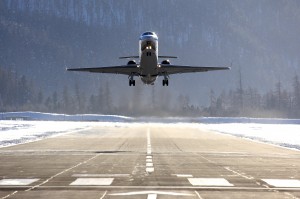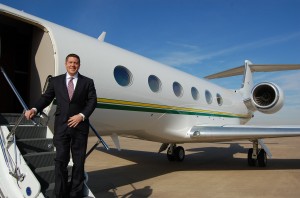With the last week of market volatility in Wall Street and across the globe, I have been asked where the aircraft market is going, and what aircraft buyers and sellers should be considering as we approach the home stretch of this year. While I don’t ever say I can predict the future, my response to my clients’ inquiries on the future involves a major discussion of market volatility, including where we are and where we’ve been.
Market Volatility in The Last Three Years
The height of the bubble that was the aircraft market was reached in early 2008. Since early 2008, most markets have been in a steady, and sometimes rapid, decline. While there is frequent discussion on the major causes of this market decline, allow me to review some raw numbers with you. Below are average aircraft “Basic Selling Prices” as recorded in Q1 of 2008 and then in Q2 of 2011. These prices are average, and I must advise you that aircraft were selling at higher and lower prices than the averages listed here, but these numbers are certainly good reference points.
| Q1 2008 | Q2 2011 | % Change | |
| 1998 Gulfstream V | $40,750,000 | $22,000,000 | -46% |
| 2002 Gulfstream V | $45,500,000 | $26,000,000 | -43% |
| 2004 G550 | $54,000,000 | $37,000,000 | -31% |
| 2007 G550 | $58,000,000 | $41,000,000 | -29% |
| 2001 Falcon 900EX | $34,800,000 | $19,500,000 | -44% |
| 2007 Falcon 900EX | $42,900,000 | $28,000,000 | -35% |
| 2001 Falcon 2000 | $22,200,000 | $11,000,000 | -50% |
| 2007 Falcon 2000EX EASy | $34,000,000 | $20,000,000 | -41% |
| 2001 Bombardier Global | $45,000,000 | $25,000,000 | -44% |
| 2007 Bombardier Global XRS | $60,000,000 | $39,000,000 | -35% |
| 2001 Hawker 800XP | $8,900,000 | $4,000,000 | -55% |
| 2007 Hawker 850XP | $13,300,000 | $7,000,000 | -47% |
| 2001 Lear 60 | $8,100,000 | $4,100,000 | -49% |
| 2007 Lear 60XR | $12,500,000 | $6,900,000 | -45% |
| 2001 Citation Excel | $8,500,000 | $4,000,000 | -53% |
| 2007 Citation XLS | $12,200,000 | $6,900,000 | -43% |
| 2005 Citation CJ3 | $7,200,000 | $4,600,000 | -36% |
| 2008 Citation CJ3 | $8,000,000 | $5,700,000 | -29% |
As you can see, aircraft values have dropped dramatically over the last 3 years. In some cases, values have dropped over 50% from their 2008 highs. “Market Correction” is an understatement.
When people see these numbers, they are often shocked. Aircraft owners and aircraft lenders have been hurt significantly by these value decreases. Aircraft buyers, especially first time buyers who do not currently own an aircraft, are almost giddy about buying an aircraft that is 40% cheaper than it was three years ago.
Are We At the Bottom?
A very common question for me is whether we are at the bottom of the market. The question is difficult for me to answer, as the market has segmented itself. Markets with the most momentum are 5 year old and younger large cabin aircraft such as the Gulfstream G550 and the Bombardier Global XRS. These markets have shown a clear bottom, mostly in the latter part of 2009, and have stabilized at prices above the 2009 bottoms. Markets that are still in a decline are all of the aircraft that are 20 years and older. Even in markets such as the Lear 60 and Hawker 800XP, significant oversupply is making it difficult for prices to show any signs of appreciation in the near future.
Taking a Step Back – Looking At the Market Opportunity
In particular, aircraft buyers should take a look at this market from a broader historical perspective. Are prices going to go lower? In some markets, there is clear data that prices hit bottom over a year ago. In other markets, they may. But, in ALL markets, prices have made a major correction, in some cases over a 50% correction. If anyone is seriously in the market, this could be just the right opportunity to secure a tremendous deal within the historical context of the market. Moreover, the quality aircraft will always sell first. So, this could very well be the time to take the “pick of the litter” in many depressed aircraft markets.
In future articles, I will take some time and look at individual aircraft markets, showing you how a particular market is behaving in the context of the broader market.
Shawn Dinning, Director of Sales & Acquisitions
Mr. Dinning acquired his formal education at the United States Air Force Academy in Colorado Springs, Colorado, in the areas of Operations Research and Management Science and also holds a degree in Aeronautical Science from Embry-Riddle Aeronautical University. Mr. Dinning brings 16 years of aviation experience from a variety of aviation disciplines, including FAR 91, FAR 121, FAR 135, defense, and shared ownership sectors. A former full-time professional pilot, Mr. Dinning holds a current Airline Transport Pilot (ATP) certificate, and is type-rated in the Gulfstream V/G550/G500/G450/G400/G350/G300, Bombardier CRJ-200, and Citation 510 Mustang. He has logged over 5500 flight hours, with 3500 of those hours in corporate turbine aircraft. Mr. Dinning has been consulted in publications such as Business & Commercial Aviation on various issues related to turbine aircraft transactions.
Mr. Dinning brings to Dallas Jet International a rare and highly valuable skill set of operational and business acumen, and has become a leader in the professional marketing and procurement of corporate turbine aircraft all around the globe. He also specializes in aircraft mission analysis, aircraft valuation, and cash flow and operating cost analysis for private aircraft owners. Mr. Dinning has a track record of successful transactions that is well known amongst his clients and colleagues. His reputation for intelligent and meticulous management of aircraft transactions have made him one of the most respected aircraft brokers in the industry.

 In my
In my  Selecting someone to guide you through an aircraft sale or purchase is an important decision. Before you select the right aircraft sales specialist, you probably will ask several questions and evaluate the answers.
Selecting someone to guide you through an aircraft sale or purchase is an important decision. Before you select the right aircraft sales specialist, you probably will ask several questions and evaluate the answers.







